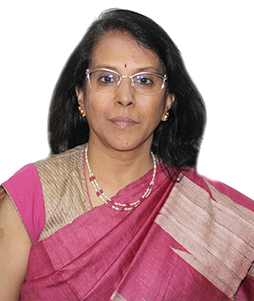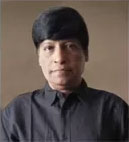
Ms Malini Shankar, retired IAS officer of the 1984 cadre, has had an exceptionally distinguished record as an administrator but in the second innings of her career she has shown that even as an academician she is nonpareil. A meritorious student, she would have shone in any career she would have chosen to. Not many would know is she is a trained Bharatanatyam dancer and has her fingers on Veena with the same aplomb that she had on her administration
In a society that thrives on patriarchal mindset, women have provided the foundation of power, grace, wisdom, justice, creativity and hope. When you educate a man, you educate a man but when you educate a woman, you educate a generation. Ms Malini Shankar, a distinguished IAS officer of the 1984 cadre – now retired – is a decorous example who has left a distinctive stamp of her seasoned administrative skills in the three and half decades that she has served, and continues to do so in the second innings of her career.
There is something very compelling about her persona. Freewheeling in her expression but measured with her words and laced with friendly wit, she has this remarkable ability to sauté her brilliance — that comes from her studious bent of mind – and her hands-on administration. Having left her mark in the civil services, she is now the Vice Chancellor of the Indian Maritime University after serving as the Director General, Shipping. If her transition from being an administrator to an academician has been seamless and smooth, it is thanks to her propensity to take challenges with an implicit belief in her capabilities.
A doctoral degree in Institutional Economics from the Indian Institute of Technology, Madras, Management degree from the Asian Institute of Management, Manila, Philippines, Master’s in Chemistry from Mount Holyoke College, Massachusetts, USA, she has had her professional mid-career training at the IIAP (Institut Internationale d’Administration Publique), in Paris, France, from where she obtained a diplome in International Economics. A large part of her career at the senior level has been spent in the water sector (municipal, irrigation, environment), and economic sectors (power, commerce and industry, shipping). Make your education valuable, apply what you learn and be a part of the change has been an abiding tenet of her life.
In a flowing narrative, Ms Malini unspooled the memories of the days when she contemplated the future roadmap: “Civil Services weren’t on the radar but yes, in high school, I was very keen on Science and wanted to do a PhD. National and International Affairs was high on my priorities, but I ended up in US doing Master’s in Chemistry (chuckles). When I was in US, I realized it was now or never. The IAS seed had been germinating slowly in my mind. I had to go for IAS or if not, at least for Research. My parents were on a conventional plane and wanted me to pursue Medicine. The pitch was queered because no one in the family was in government job. The IIT buoyed and lifted my spirits in doing a doctorate that called for intense scientific research.”
Coming from a modest, middle class background, the one strong advantage was intelligence as the lineage of the family. There were plenty of options to choose from but it was also a problem of the plenty. There were many opportunities in higher education that beckoned, including Fellowships abroad. “I wasn’t a rebel in that sense of word but I did strongly resist the idea of becoming a doctor. It was the same with Forensic Science which didn’t appeal to my academic senses at all. However, pursuing education abroad was financially prohibitive and although we had properties, we also were aware of the fact that you need to have hard cash. I even toyed with the idea of studying Law; most of it which I grasped by reading at home. It wasn’t exactly a turmoil that I went through but I had a lots choices and I am glad I settled for Civil Services,” she avers.
As it turned out, her sense of judgment was spot on. Her proficiency in Public Administration, Management, Water Resource Management, Policy Analysis, Organizational Development, and Public Management put her in the league of strong business development professionals. While her sound academic background has stood her in good stead as an academician, her potential for capacity building, introduction of technology and modern management systems and practices, and citizen-friendly initiatives have been well acknowledged.
Like all her predecessors and contemporaries, she was saddled with over 10 postings (12 to be precise) and transfers were part of the job but each one came with its accompanying challenges and called for different skill sets. “I have memories of some which were a great learning curve and as the CEO of Zilla Parishad, Chandrapur was one such. At that time there were no elected members of the Panchayat Samiti or Zilla Parishad and I didn’t have much exposure to developmental activities. But my vistas opened up there as I was on my own and in the Naxal-forest difficult terrain inhabited by tribals with its complex industrial problems. I recall I was called to take a dying declaration at 8pm. Taking the help of the police wasn’t tactically wise given the presence of Naxals in the district. It would have only worsened things. It took a while although it wasn’t very tough to understand the tribal language which had a strange mix of Telugu and local dialect. I could understand the tribal psyche and communicate with them albeit in broken words. It proved to be a strong confidence-building measure. It was an exercise in revelation because it was an expanse where you needed lot of conventional wisdom and I could sail through without fear. Being able to strike conversation with the locals, the rustic ethos and he risk-filled ambience of the place with its ubiquitous bullock-carts, farming, seeding helped me understanding the ropes of development. Another posting I recall was being the Principal Secretary of the Command Area Development during the infamous Irrigation Scam. While putting the systems in place I also got to know some of the best engineers brains.”
Ms Malini believes that challenges are actually learning curves. “It is not about the postings but how you evolve as you go up. I have learnt that to be a good officer, you should be able to identify the pressure points. One senior educated me how one must work objectively in the wake of the situations that the system throws at you from time to time. It is a sum total of your caliber and the wisdom gathered from your experience. But equally and if not more importantly, it calls for patience and commitment. While in service, encouragement from parents and strong support from my husband have not only helped me but also inspired me to strive harder. My 30-plus years in administration have been an exciting and enriching journey — an experience I would exchange for none other. There has never been a dull moment in my three decades. Challenging moments, yes, but not dull. The diversity of assignments, the spectrum of people that one gets to interact with and the opportunity to be independent and creative are invaluable attributes in the IAS.”
To the awards and recognitions that kept coming her way, she feels that one either works hard or work for an award, she philosophizes tongue in cheek In recognition of her professional achievements, she has been invited by academic and professional organizations to contribute to policy-making and represented India in international fora. She was nominated by the IMO as an honorary Member of the Board of Directors of the World Maritime University. She is the first Indian woman to have been selected as one of the 7 global recipients of the AAA Award by the Asian Institute of Management, Manila, Philippines. She was invited as an expert on water sector, to make a presentation to the Committee responsible for drafting the new National Water Policy for India.
For someone who is sensitive, forward-thinking and does not hesitate to call spade a spade, Ms Malini asserts that building right systems and motivating people is the key element while handling various profiles. You have to start from the scratch. My stint as full time Vice Chancellor is also peppered with administrative skills. As academia sensitivity to institution building and capacity building with at times no wherewithal assumes paramount importance. To be able to achieve that is in itself a reward.”
An avowed nature lover, Ms Malini finds herself in harmony with nature’s ecosystem. Her belief that “Nature is substitute for God and has so much of variety to offer” is evident in her Facebook profile. “I am a trained Bharatanatyam dancer and can strum the Veena but work constraints leave little time. If and when time permits, I love travelling but most of the times these are short getaways. India is so well endowed with scenic places that you don’t really miss going abroad to soothe sights. The Western Ghats and the treks in Himalayas are an enduring memory. As bureaucrat I liked my work. I have contributed several articles and God willing, I may write a book too but I get lethargic too,” she admits jovially.
With so many facets to her ebullient personality, Ms Malini is true manifestation of joie de vivre.

A Column By
Raju Korti – Editor
The Resource 24X7
A Journalist With 4 Decades of Experience With Leading Media Houses.
